- Home
- Vince Flynn
The Third Option Page 15
The Third Option Read online
Page 15
Mitch was good at what he did. That much she knew. She had seen him in action during the White House hostage crisis. He was a one-man SWAT team, but in the end he was human. He bled like everyone else. Rielly’s father was a cop, and so were two of her brothers. They all worked for the Chicago PD. Rielly had seen invincible men go down. They were all stubborn just like Mitch. If she was lucky enough to see Mitch again, she would show him what stubborn was all about. He would retire whether he liked it or not, and they would walk down the aisle together. She had come too far and gone through too much to lose him.
Rielly was still seething as she yanked open the door and entered the main-floor foyer of the West Wing. The Secret Service officer sitting behind the desk smiled at her, but she ignored him. She’d been faking her mood for the last two hours as she talked to the producers in New York, and enough was enough. As she turned to her right, she heard her name called from behind.
Jack Warch, the special agent in charge of the president’s Secret Service detail, rounded the corner with a file in his hand. “How are you tonight, Anna?”
Rielly brushed a wayward strand of her auburn hair off her face and said, “Not so good, Jack. What are you still doing here?”
“The president is working late tonight.”
Rielly paused and looked down the hall past Warch, in the direction of the Oval Office. There was a good chance the man behind that door knew where Mitch was. Whether he would admit to that was a whole other matter. After the terrorist attack on the White House had ended, President Hayes had personally pleaded with Rielly to remain silent about the identity of Mitch Rapp. The president didn’t want the press, the politicians on the Hill, and the militia nuts to find out that a covert operative for the CIA had been the driving force behind the successful rescue of the hostages. In return for her cooperation, the president had agreed to grant her unusual access. As she and Mitch became close, he had made it very clear that she was never to use her access to the president to dig for information about what he did for the CIA. Considering what she’d gone through over the last two days, breaking that promise seemed minor.
“Who’s he with?”
Warch smiled. “You know I can’t tell you that.”
There was no smile on Anna’s face. “I need to see him.”
The Secret Service agent could tell she was serious and looked back down the hall for a second. Looking back to Rielly, he said, “Stay right here. I’ll see what I can do.”
Rielly waited in the foyer and took off her black raincoat. She thought about calling the O’Rourkes. Michael had dropped her off at the White House this morning, and she had promised Liz that she would call when she was done with the nightly news so Michael could come pick her up. She was about to pick up the handset on one of the house phones when Warch came back around the corner.
“Come with me, Anna.” The agent turned around and started back down the hallway, Rielly on his heels.
PRESIDENT HAYES WAS sitting behind his desk in the Oval Office when they entered the room. Jazz music was playing softly from a stereo that Rielly could not see. The president was sandwiched between two stacks of manila files, busily scanning documents and signing his name. As Warch and Rielly approached the desk, he grabbed a new file, read the note that was paper-clipped to the front, opened the file, and signed his name on four separate pages. The folder was closed and placed on top of the pile on his right. Hayes took off his reading glasses and stood, putting on his suit coat.
Walking around the desk, he said, “Good evening, Anna.” Hayes extended his hand. He really liked Rielly. Like all reporters, she could be tough on him, but she had kept her word when he’d asked for it, and that was not something to be taken lightly, considering her profession.
“Good evening, Mr. President.”
Hayes knew that Rielly had been seeing Rapp. How close they were he didn’t know and wasn’t about to ask. It had been a very long day, the first lady was out of the country, and he was bushed. He wanted to tune out, not to have to carefully measure every word that left his lips. The president looked at Warch and said, “Thank you, Jack.” When Warch had left the room, Hayes brought Rielly over to the couches and sat next to her. He silently hoped this would be about anything other than Mitch Rapp. “What’s on your mind, Anna?”
Rielly stared down at her fingers for a moment. “Sir.” She hesitated not knowing quite where to start. “This is all off the record. Very far off the record. It will never be on any record.”
Hayes grinned. “All right.”
“Where is Mitch, and what kind of trouble is he in?”
The grin on Hayes’s face vanished. He began to cautiously consider his reply. “Anna, you already know more than you should. What Mitch does for—” The president paused. He was going to say “the government” but decided that would be too much of an admission. “What Mitch decides to do on his own is something that I am not at liberty to discuss.”
“So you know where he is right now?” Rielly stared at the president with her green eyes, watching every little expression.
Having his law degree and working in Washington for several decades allowed Hayes to focus on the words right now. The president shook his head. “I have no idea where Mitch is.”
“Do you know why he left the country on Thursday?”
Hayes blinked several times and said, “No…I don’t.”
Rielly studied him. “Sir, with all due respect, I don’t think you are being entirely honest with me.”
“Anna, I don’t think we should be talking about this.”
“Sir, I did you and your administration a huge favor by not going public with my story after the hostage crisis was ended.”
“Yes, you did, but this has nothing to do with that.”
Rielly’s voice took on a more confrontational tone. “It has everything to do with it.”
Hayes held up his hands. He didn’t want this to get heated. “Anna, for your loyalty, you have been given phenomenal access. The fact that you were able to get in here to see me at this hour speaks volumes.”
Rielly cut him off. “And that has been greatly appreciated, sir. But that was the deal you made so I would stay quiet.”
“That’s not the only reason you’ve stayed quiet.”
“What do you mean?”
“Anna, Mitch saved your life. He saved mine. He saved a lot of people’s. His wish to keep his life private deserves our respect and continued commitment.”
“I owe Mitch my life. A day doesn’t go by when I don’t think about it.” She frowned. “Please don’t confuse the issue here. This is not about keeping Mitch’s life private. I’m not going to tell anybody about what he does for the CIA. This is about me being worried sick that something has happened to Mitch. It’s about me needing to know if he’s all right.”
Hayes sighed and looked up at the ceiling. He couldn’t believe he was discussing something with a reporter that he wouldn’t even discuss with his own national security advisor.
Rielly reached out and touched his arm. “Sir, all I want to know is if he’s all right. As far as I’m concerned, we never had this conversation.”
“As far as I know”—Hayes shook his head—“he’s fine. But that’s all I’m going to say.”
Rielly’s face lit up. She reached out and grabbed the president’s hand. “Thank you, sir.”
It was dark when American Airlines Flight 602 touched down on the runway at Baltimore Washington International Airport. The flight had just completed its 1,565-mile nonstop journey from San Juan, Puerto Rico. Mitch Rapp looked down at his watch as they taxied to the gate. It was twenty past nine on Monday evening. Once he was out of Germany, the journey back to America had been fairly simple. From Lyon, France, he had taken a Trans North Aviation flight to Fort de France, Martinique, in the Caribbean. The nonstop 4,440-mile flight allowed him to catch a full six hours of sleep as he stretched out in first class. On the tiny island, which was an overseas department of France, he had che
cked into a quaint family-run hotel up in the hills overlooking the blue waters of the eastern Caribbean Sea. Rapp paid for both Saturday and Sunday night in cash. Sunday was spent by the pool, relaxing, healing, staring out at the fishing village below, and planning his next step. That evening, he’d allowed himself a cold six-pack while he sat on his balcony and listened to the waves crash in on the rocky shoreline below. He’d allowed his imagination to roam as he thought about what he’d do to the Hoffmans when he got his hands on them.
That night he’d slept for almost eight hours. He awoke with a slight hangover, but after a jog down to the water and a one-mile swim, he felt invigorated and ready to face whatever awaited him back in the States. The two nights and one day spent on tranquil Martinique had brought his mind and body back into focus.
On Monday morning he caught an Air Guadeloupe flight to San Juan, where he cleared U.S. Customs. Monday afternoon was spent shopping for new clothes and eating, and then at 6:15 that evening, he boarded the flight for Maryland. Rapp stepped off the plane in Baltimore looking every bit the tourist who had just returned from a weekend in the sun. He was wearing a faded red baseball cap from Larry’s Dive Shop in San Juan, a blue-and-white Hawaiian shirt, a pair of khakis, and blue boat shoes. His face and forearms were tanned.
Rapp was all but sure the folks at Langley had not been able to track him. He had traveled using two separate identities, identities the watchers at Langley had never been told of. If they got lucky and saw him on one of the airport’s security tapes, that would be fine. He would be gone by then, having disappeared into a city that he knew intimately. There was a chance they might have people at the airport staking out the gates. If they were there, Rapp was confident he’d spot them. As he walked with the rest of the vacationers toward the baggage claim, Rapp stayed close to two women he had met at the airport in San Juan. He kept the brim of his hat down and his eyes alert. He’d stay with the crowd until he was sure he could make a safe break.
On Martinique, Rapp had devised three different plans. The first stage of each involved obtaining some protection. None of them involved going back to the house. At least not until he did a little digging and found out what in the hell had happened. Anna also would have to wait. He desperately wanted to talk to her but knew it was a bad idea, and for more than one reason. She would want him just to walk away and put the whole thing behind him. What she didn’t understand was that in this line of work, loose ends had a way of coming back and biting you in the ass. He would get word to her that he was safe and back in the country, but that would be it.
When the herd of freshly tanned tourists neared the baggage claim, the two women from Bowie, Maryland, suggested to Rapp that they get together for drinks. Rapp smiled sheepishly and told them he didn’t think his girlfriend would like the idea. With that, he took the escalator up and walked out the door onto the curb. There were three cabs within thirty feet in either direction. All three were dropping passengers off. The drivers were not allowed to pick up passengers on the departure level. They were supposed to go back downstairs and line up with everybody else. Rapp waited for one of the cabbies to get back in his vehicle and then darted into the back seat. Before the cabbie could protest, Rapp shoved a fifty-dollar bill in his face. The money did the trick. The cabbie looked around to see if anybody had noticed and then put the car in drive.
“The Hyatt Regency in Bethesda, please.”
The man nodded and pushed the button to start the meter. Rapp turned sideways so he could glance out the back window to see if someone might be following. A few minutes later, they were on Interstate 95 headed south for Washington. The drive proved uneventful, at least as far as Rapp could tell. One never knew anymore, though. In this day of satellites and microtransmitters, eyes and ears could follow from hundreds of miles away, and you’d have no way of knowing.
When the cab pulled up to the Hyatt, Rapp gave the driver another fifty and then went through the revolving front door and into the lobby. After finding the payphones, he plugged in some change and dialed a number from memory. After six rings, an answering machine greeted him. Rapp took this as a good sign. The odds just went up that Marcus Dumond would be where he wanted him to be. Before leaving the lobby, Rapp grabbed a sweatshirt out of his backpack. It was a little cooler here than it had been in the Caribbean.
The coffee shop was six blocks away. It was the brainchild of Marcus Dumond. Mitch Rapp and his brother Steven had put up the money and were silent partners. The name of the place was Café Wired. It was one of the original Internet coffee shops, and Rapp was sure one of the only profitable ones. Rapp had met the incredibly unique Dumond while he was a graduate student at MIT with Rapp’s brother. Dumond could be classified as one of those people who was smart in school and dumb on the bus.
Dumond was a twenty-seven-year-old computer genius and almost convicted felon. Rapp had brought Dumond into the fold at Langley three years earlier. The young cyber-genius had run into some trouble with the feds while he was earning his master’s degree in computer science at MIT. He was alleged to have hacked into one of New York’s largest banks and then transferred funds into several overseas accounts. The part that interested the CIA was that Dumond wasn’t caught because he left a trail; he was caught because he got drunk one night and bragged about his financial plunders to the wrong person.
At the time of the alleged crime, Dumond was living with Steven Rapp. When the older Rapp heard about Dumond’s problems with the FBI, he called Irene Kennedy and told her the hacker was worth a look. Langley doesn’t like to admit the fact that they employ some of the world’s best computer pirates, but these young cyber-geeks are encouraged to hack into any and every computer system they can. Most of these hacking raids are directed at foreign companies, banks, governments, and military computer systems. But just getting into a system isn’t enough. The challenge is to hack in, get the information, and get out without leaving a trace that the system was ever compromised. Dumond was a natural at it, and his talents were put to good use in the Counterterrorism Center.
Rapp opened the door and stepped into a room filled with the aroma of fresh-ground coffee. There, sitting in the rear of the establishment, was Marcus Dumond, with his back to the door. Rapp frowned. Dumond’s instincts were horrible. He would last about five minutes in the field. Rapp stopped at the counter and said hello to the young woman who was working. He was pleased to see that, unlike the last one, this employee didn’t have any pierced body parts, at least none that he could see. Rapp tried to read the hodgepodge of flavors, blends, and specials scrawled across the grade-school chalkboard that hung on the wall above the espresso machines.
The number of choices was too great. “I’ll just take a cup of your daily roast.”
“Small, medium, or large?”
“Large, please.”
Rapp continued to check the place out. There were fourteen customers at the moment. Most of them looked to be around twenty. The four computers on the back wall were all being used, one customer was reading a book, and two more were scribbling in spiral notebooks. Aspiring anarchists, Rapp thought to himself. The rest of the customers were working on their own laptops.
Dumond was sitting at a table with two women surfing the Web and chatting. Dumond had heard the familiar voice ask for a cup of coffee, and he fought the urge to turn around and look. It belonged to Mitch Rapp, a man he knew things about that he wasn’t supposed to—that no one was supposed to. It wasn’t unusual for Rapp to stop by the café, but he usually did it on Sundays with his girlfriend. Dumond stood and grabbed his half-finished cup of coffee. As he walked up to the counter, he unconsciously licked his suddenly parched lips.
Rapp paid for his coffee and thanked the woman. As he turned, he faced Dumond and nodded toward the back. The two men picked their way through the tables and chairs and sat down in a booth next to the bathrooms. Rapp took the side facing the front door.
“Nice afro, Marcus.”
Dumond instinctively re
ached up and touched his black hair. “They’re coming back, you know.”
“I’m sure Dr. J will be happy to hear that.”
“Who?”
Mitch shook his head and grinned. Marcus had to be the only twenty-eight-year-old African American in D.C. who didn’t know who Dr. J was. “Never mind.”
“You look like you’ve been in the sun.”
“I’ve been traveling.”
“Business or pleasure?”
Rapp grabbed his cup of coffee with both hands and said, “Business.”
“How did it go?” asked Dumond a little tentatively.
“Not so good.” Rapp took a sip. “How have things been at the center?” He was referring to the Counterterrorism Center.
“Same old shit.”
“Nothing unusual in the last three days?”
“No.” Dumond frowned. “Nothing that came across my screen.”

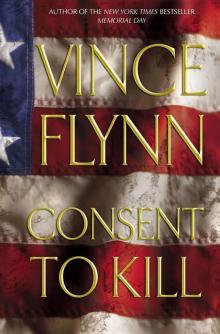 Consent to Kill
Consent to Kill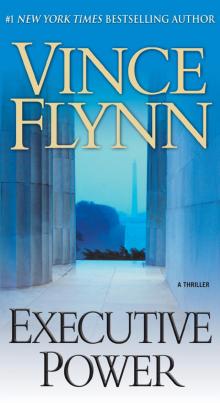 Executive Power
Executive Power Protect and Defend
Protect and Defend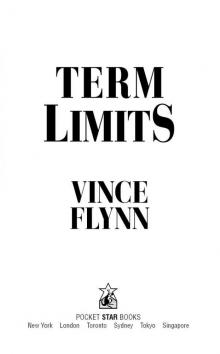 Term Limits
Term Limits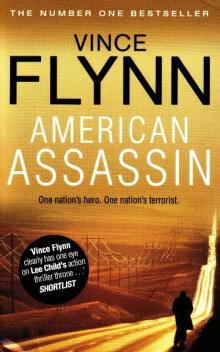 American Assassin
American Assassin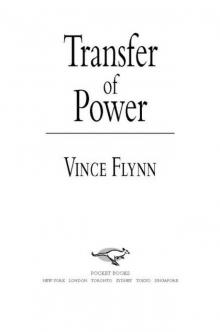 Transfer of Power
Transfer of Power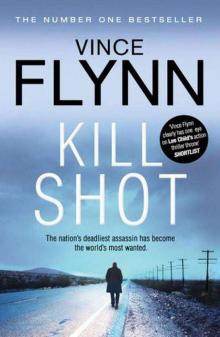 Kill Shot
Kill Shot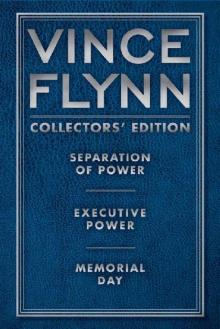 Vince Flynn Collectors' Edition 2
Vince Flynn Collectors' Edition 2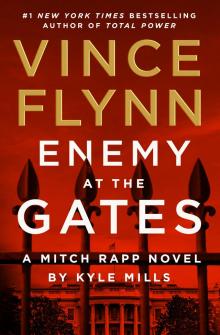 Enemy at the Gates
Enemy at the Gates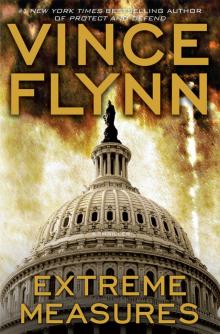 Extreme Measures
Extreme Measures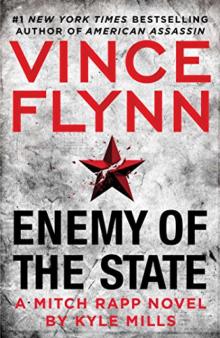 Enemy of the State
Enemy of the State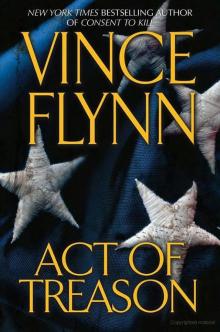 Act of Treason
Act of Treason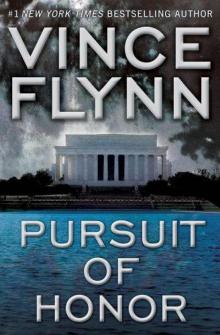 Pursuit of Honor
Pursuit of Honor The Survivor
The Survivor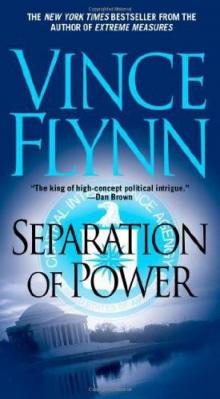 Separation of Power
Separation of Power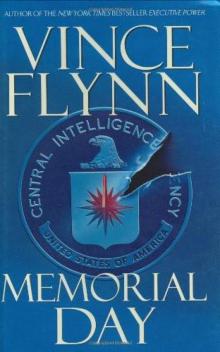 Memorial Day
Memorial Day The Last Man
The Last Man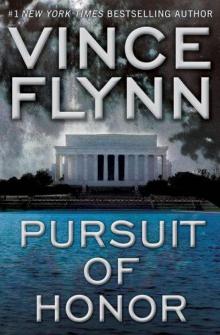 Pursuit of Honor_A Thriller
Pursuit of Honor_A Thriller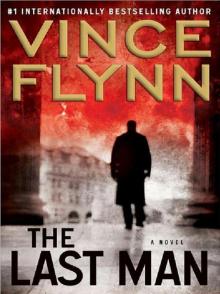 Mitch Rapp 13 - The Last Man
Mitch Rapp 13 - The Last Man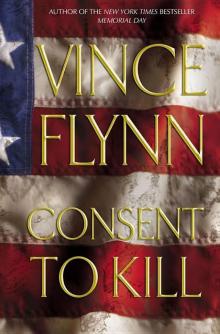 Consent to Kill:
Consent to Kill: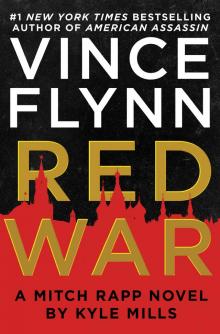 Red War
Red War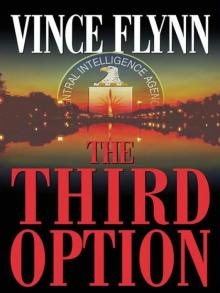 Mitch Rapp 02 - The Third Option
Mitch Rapp 02 - The Third Option Mitch Rapp 05 - Memorial Day
Mitch Rapp 05 - Memorial Day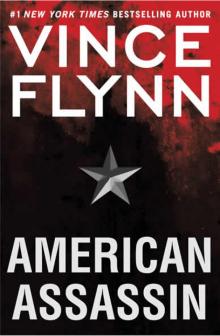 Mitch Rapp 11 - American Assassin
Mitch Rapp 11 - American Assassin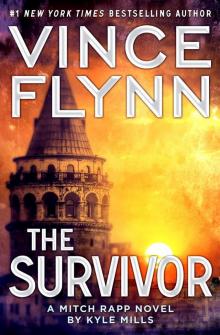 Mitch Rapp 14 - The Survivor
Mitch Rapp 14 - The Survivor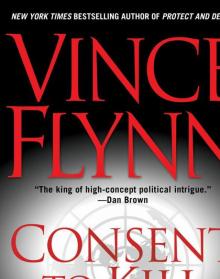 Mitch Rapp 06 - Consent to Kill
Mitch Rapp 06 - Consent to Kill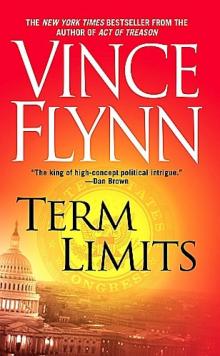 Term Limits mr-1
Term Limits mr-1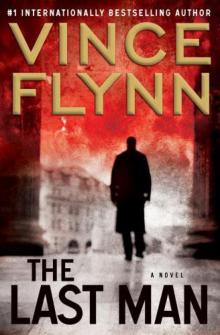 The Last Man mr-13
The Last Man mr-13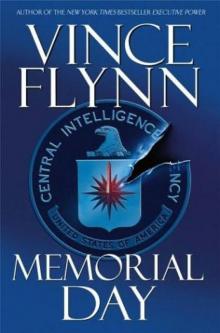 Memorial Day mr-5
Memorial Day mr-5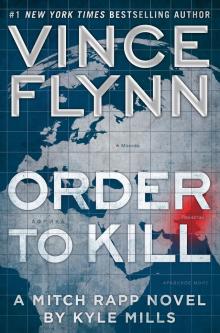 Order to Kill
Order to Kill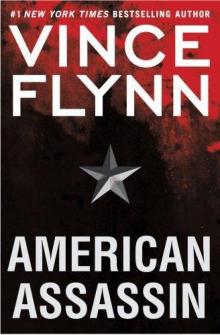 American Assassin: A Thriller
American Assassin: A Thriller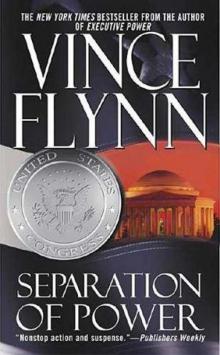 Separation of Power mr-3
Separation of Power mr-3